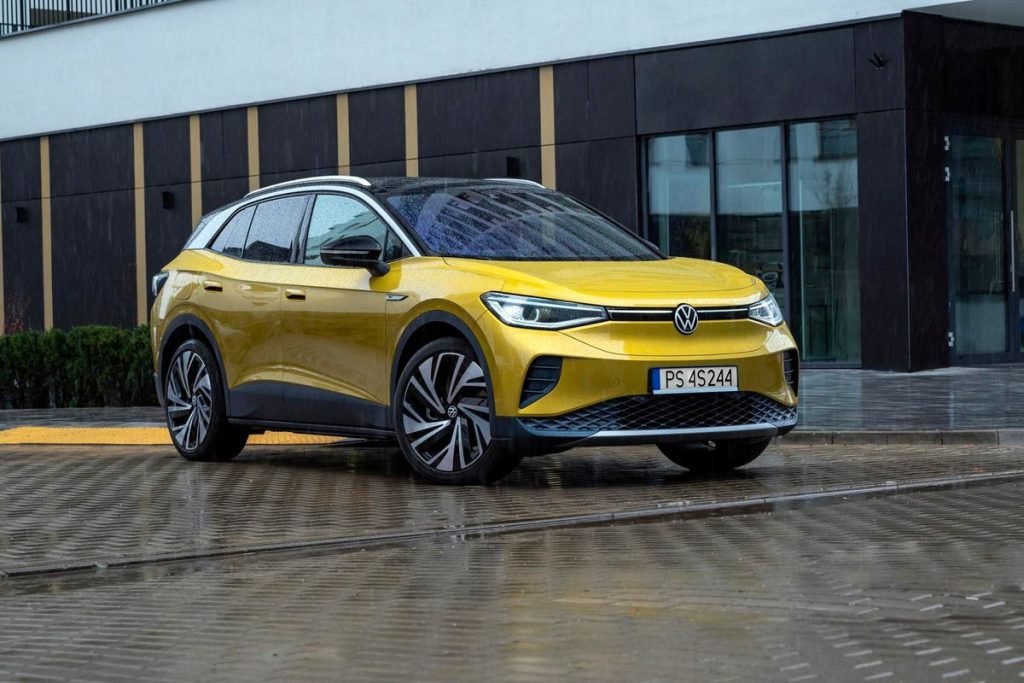Volkswagen shares dived nearly 3% Thursday after it shaved its global sales forecast for 2023 and reported lower-than-expected profits for the 2nd quarter.
The share price fall initially was almost twice as fast as the overall industry’s just over 1.2% fall, as measured by the European Auto STOXX 600 index. VW investors recovered their poise later and the shares rallied.
VW shares have been on the slide since peaking briefly at €160 last month after a special investor’s meeting sought to change the company’s strategy to prioritize profits over sales.
According to Automotive News Europe, Volkswagen reported Thursday adjusted operating profit in the 2nd quarter was €5.6 billion ($6.2 billion), missing analyst projections.
A Volkswagen statement said the profit outlook for 2023 was confirmed, but the sales forecast was “slightly adapted” from around 9.5 million vehicles to 9 to 9.5 million.
“We have strategically realigned and restructured the Volkswagen Group, with a clear plan and measurable milestones. In the first half of the year, the Volkswagen Group delivered reliably with very solid results,” Volkswagen Group CEO Oliver Blume said.
“Sales in North America are picking up, we are strengthening our position in China through technological partnerships and on top of that the trend for fully electric vehicles is moving in the right direction. What is important to us is long-term, sustainable growth, with a focus on value over volume,” Blume said, echoing the message from last month’s special meeting.
That meeting pledged to rejuvenate the sagging profitability of its mass-market brands Skoda, SEAT, commercial vehicles and its own VW namesake. In the first half these brands’ operating margin was 5.5%.
In the first half of 2023, VW’s group margin was 8.9%, above the guidance range of 7.5% to 8.5%.
Moody’s Investors Service expects VW will succeed in raising the profitability of the lagging brands.
“We expect that the relatively low profitability of the brand group “Core” will improve to a more competitive level, supporting a more balanced profit generation within the group,” said Moody’s analyst Matthias Heck, in a report in which said VW’s outlook remained “stable”.
The report, published last week, expected group margins to hold at around 7%, “notwithstanding some weakening we expect for 2023”.
Moody’s said investors would worry about VW’s position in a highly cyclical industry, and weakness in China, its largest market. Strong performances at the Audi and Porsche premium brands mitigated core brand weakness.
Moody’s said the transition to electric cars was a risk to investors, but VW had a credible strategy.
“Key risks for automakers, including Volkswagen, include a loss of market share, inability to earn adequate profits and returns on electric vehicles, as well as inability to manufacture vehicles due to potential constraints in the supply of critical materials,” the report said.
The management structure was a concern too.
“Volkswagen’s rating remains constrained by high governance risks. These are exemplified by the highly complex group structure, with multiple stakeholders, including the family owners, the German State of Lower Saxony and workers unions, and the existence of minority shareholders in key businesses, and the JVs in China.”
“The history of high management turnover within the group, including the early replacement of the CEO in September 2022, and the early replacement of the divisional CEO of Audi in June 2023, result in a weak management credibility and track record under Moody’s ESG criteria, with the need to build credibility. These weaknesses are only partially mitigated by the company’s conservative financial strategy and risk management,” according to the report.
VW has recently announced plans to plug gaps in its lineup in China. Audi said it was expanding its agreement with SAIC to include its electric car engineering in its lineup for EVs sold in China in a sector where Audi currently does not offer any vehicles. Later VW said it would invest $700 million to take a 5% stake China’s upmarket Xpeng. The companies will develop two midsize EVs for VW for introduction in 2026.
Volkswagen makes about half of its profits in China.
VW’s special investors meeting implied it accepted the need to reduce headcount to increase efficiency to its competitors’ levels. In the past this notion would suffer the traditional union veto but now there is an easier path as the ageing workforce will be taking retirement in increasing numbers.
Volkswagen’s previously announced plan was to cut €10 billion ($10.9 billion) out of its costs and raise overall returns on sales to 6.5% at its core VW brand. The mass market brands have been ordered to streamline their product ranges.
The overall VW group is targeting operating profits of 9 to 11% by 2030, up from 8.1% last year, with the watchwords being “value over volume”. Annual sales growth is projected to be between 5 and 7% on average until 2027.
VW is controlled by a 20-seat supervisory board where unions control half the votes and two politicians from the state of Lower Saxony often vote with labor. For decades, investors have backed off from VW shares because the clunky management structure has blocked attempts to turn the company into a normal corporation where profit-conscious shareholders call the shots.
Meanwhile, VW shares recovered a bit to close down 1.77% at €146.9, while the STOXX 600 fell about 2%.
Read the full article here










